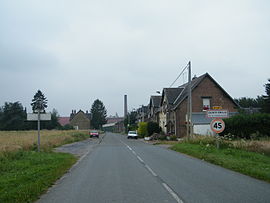Villers-Faucon (French pronunciation: [vilɛʁ fokɔ̃]) is a commune in the Somme department in Hauts-de-France in northern France.
Villers-Faucon | |
|---|---|
 The road into Sainte-Emilie | |
| Coordinates: 49°58′39″N 3°06′00″E / 49.9775°N 3.1°E | |
| Country | France |
| Region | Hauts-de-France |
| Department | Somme |
| Arrondissement | Péronne |
| Canton | Péronne |
| Intercommunality | Haute Somme |
| Government | |
| • Mayor (2020–2026) | Séverine Mordacq[1] |
Area 1 | 11.42 km2 (4.41 sq mi) |
| Population (2022)[2] | 541 |
| • Density | 47/km2 (120/sq mi) |
| Time zone | UTC+01:00 (CET) |
| • Summer (DST) | UTC+02:00 (CEST) |
| INSEE/Postal code | 80802 /80240 |
| Elevation | 75–144 m (246–472 ft) (avg. 104 m or 341 ft) |
| 1 French Land Register data, which excludes lakes, ponds, glaciers > 1 km2 (0.386 sq mi or 247 acres) and river estuaries. | |
Geography
editThe commune is situated 15 miles (24 km) northwest of Saint-Quentin, at the D72 and D101 crossroads, in the far east of the département. The commune also includes the hamlet of Sainte-Emilie.
Population
edit| Year | Pop. | ±% p.a. |
|---|---|---|
| 1968 | 916 | — |
| 1975 | 803 | −1.86% |
| 1982 | 704 | −1.86% |
| 1990 | 662 | −0.77% |
| 1999 | 625 | −0.64% |
| 2007 | 660 | +0.68% |
| 2012 | 649 | −0.34% |
| 2017 | 588 | −1.95% |
| Source: INSEE[3] | ||
History
editAccording to Abbot Decagny of Roisel, Villers-Faucon was originally Villers-Falcon and previously Villare Falconis, which means, in Latin, villa of the hawks. Villers-Faucon's original purpose was that of a falconry, located in the heart of the forest of Arrouaise.
The village was almost totally destroyed in 1916, during the First World War. Following a withdrawal of German troops around the Hindenburg line, the inhabitants were evacuated to the north to Denain, tons of dynamite were set off around all of the buildings in the town (including the sugar refinery at St. Emilie) and all the trees were cut down, to leave the field open for the approach of troops. The village was destroyed, but the cemetery was left untouched.
After the conflict, reconstruction began, which lasted almost a decade, led by a rebuilding cooperative led by Louis Faille.
Sites and monuments
edit- Notre Dame church was rebuilt in 1932 by architect Louis Faille. It's one of many public buildings completed by the architect in his work during the period of reconstruction of the eastern part of the Somme.
Notable resident
editVillers-Faucon is the birthplace of:
- Hélène Nautré (1904-1976), French resistance fighter and politician.[4]
See also
editReferences
edit- ^ "Répertoire national des élus: les maires" (in French). data.gouv.fr, Plateforme ouverte des données publiques françaises. 13 September 2022.
- ^ "Populations de référence 2022" (in French). The National Institute of Statistics and Economic Studies. 19 December 2024.
- ^ Population en historique depuis 1968, INSEE
- ^ "Hélène, Laëtitia, Marie Nautré - Base de données des députés français depuis 1789 - Assemblée nationale". www2.assemblee-nationale.fr. Retrieved 2022-01-21.
External links
edit



